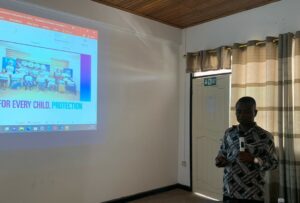Capitation grant inadequate to support inclusive education – GFD
 The Ghana Federation of Disability (GFD) has called on the Government to increase grant allocation for schools to support inclusive education and enhance effective administration of schools.
The Ghana Federation of Disability (GFD) has called on the Government to increase grant allocation for schools to support inclusive education and enhance effective administration of schools.
Mr George Frimpong, the Central Regional President of GFD, said government’s inability to release the capitation grants on time was another hitch adversely affecting quality academic work.
Schools he noted were not able to provide teaching and learning materials for students due to the unavailability of funds.
The capitation Grant is a policy initiated by the government to eliminate extra fees and charges at the basic school level.
Speaking at the Regional Child Protection Committee meeting and dissemination of Ghana report to UN, Mr Frimpong said children living with disability were struggling to access education, hence the need for Government to prioritize inclusive education in the country.
The meeting was geared towards accessing the wellbeing of such children in the Region, identify the challenges confronting them and devise strategies to address the issues for their growth.
It was organized by the Department of Children with representatives from the Department of Gender, National Youth Authority, Ghana AIDS Commission, Ghana Health and Education Services attending.
Others were the Ghana Immigration Service, the Legal Aid, the Narcotics Control Commission, and the National Commission on Civic Education (NCCE).
He said children with special needs required and deserved special care and attention to unearth their talents and potential to enable them to contribute to the socio-economic development of the country in future
‘The capitation fund is inadequate, and so children accessing inclusive education suffer because they do not get the needed support from the state which should prioritize their needs, and there must be a way out to help them’ he added.
Mr Frimpong said the current educational system was a hindrance to PWDs achieving their full potential, adding that “if the environment is friendly, we can participate fully and contribute to development.”
Hence, he called for a comprehensive mechanism to address factors militating against the progressive march of PWDs in general to improve their standard of living.
Ms Grace Kensah, an Assistant Programs Officer at the Department of Children, said protection of children was a collective responsibility of all stakeholders in the country.
Violence against children, she noted, was widespread and therefore all institutions should be further strengthened to help resolve and reduce the menace to its barest minimum.
Ms Kensah called on parents to prioritize the safety and protection of their children and urged the public to report any form of child abuse to the appropriate institutions.
Mr David Allan Paintsil, an Assistant Director at the Regional Coordinating Council (RCC), said the healthy development of children was crucial to the wellbeing of every society.
Children, he observed, were vulnerable and therefore, activities geared towards their development should be supported by all.
Reports reaching the RCC, he indicated was that parental neglect was high in the Region and it was time to bring all hands-on deck to fight the menace.
“Proper parenting is the surest way of producing quality children for the community and country as a whole” Mr Paintsil added.
Source: GNA
